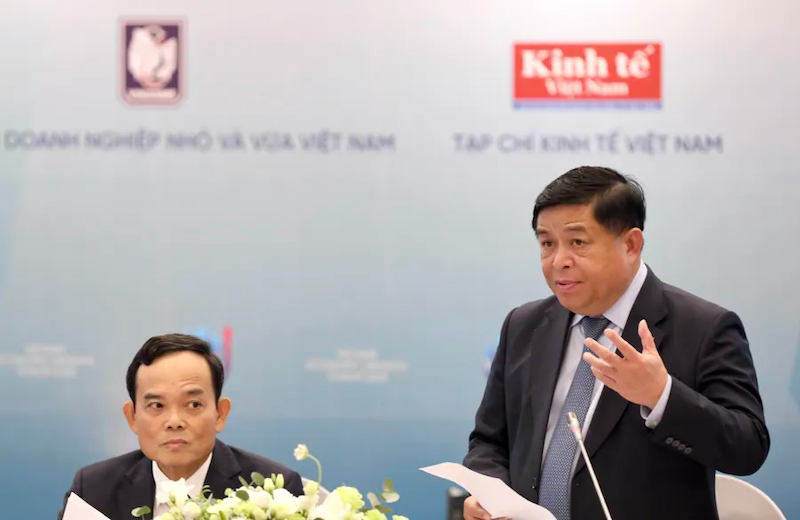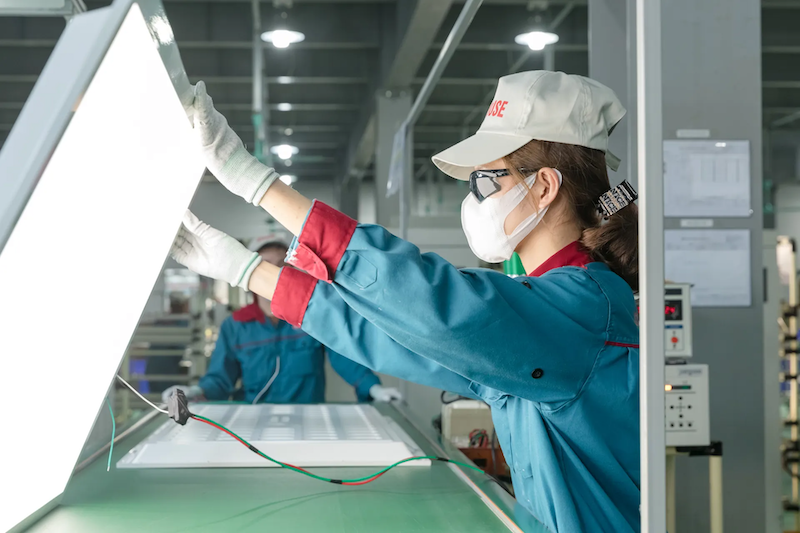Public-private unity needed for breakthroughs in Vietnam
Vietnam has set targets of 8% growth in 2025 and over 10% annually until 2030, driven by strategic reforms, innovation, and stronger leadership from the private sector.
Amid Vietnam’s strongest first-half growth in 15 years, policymakers and business leaders are intensifying efforts to sustain momentum and steer the country toward high-income status.
At the Vietnam Economic Growth Forum 2025 in Hanoi, Deputy Prime Minister Nguyen Chi Dung outlined a roadmap targeting 8% GDP growth this year and over 10% annually from 2026 to 2030.
He urged businesses, investors, and local governments to align with the central government in advancing a shared vision of a prosperous and resilient Vietnam in the new era.

Deputy Prime Minister Nguyen Chi Dung (right) speaks at the Vietnam Economic Growth Forum 2025. Photos: Khac Kien/The Hanoi Times
Despite global economic headwinds, Vietnam recorded 7.52% GDP growth in the first half of 2025, the highest in 15 years. After nearly four decades of reform, Vietnam now ranks the world’s 32nd largest economy, with a GDP per capita of over US$4,700, approaching the threshold for high-middle income status.
To sustain this momentum, the government will prioritize institutional reforms, streamline administrative procedures, and remove obstacles for over 2,800 delayed projects valued at more than $235 billion.
Public investment will catalyze to mobilization of private capital, with a focus on infrastructure and new energy sectors, he said.
Other key measures include expanding development space through the two-tier local government model and restructuring administrative units to improve governance.
The deputy prime minister also underlined the importance of adopting advanced technologies, particularly digital transformation, artificial intelligence (AI), semiconductors, and green innovation, as well as new economic models, such as free trade zones and international financial centers.
“Vietnam will also focus on attracting large-scale, strategic investments that generate spillover effects, while strengthening international integration and ensuring national independence and resilience in a volatile global environment,” Dung said.
Private sector voices: Reform, innovation, access to capital

Production line at Sunhouse Group's plant.
At the forum, major enterprises, industry associations, and economists agreed that lifting regulatory barriers is essential for rapid, sustainable growth. They urged the government to support businesses in new, high-tech industries through joint investment in technology, human resources, and infrastructure via development funds aligned with national priorities.
Nguyen Xuan Phu, Vice Chairman of the Hanoi Association of Small and Medium Enterprises (SMEs) and Chairman of Sunhouse Group JSC, said the state must play a more active role in shaping a competitive foundation for businesses. Tax incentives, market access, technology, and financing could empower Vietnamese enterprises to compete globally.
In the textile and garment industry, Vinatex Chairman Le Tien Truong called for policies that promote green and circular production models. He argued that environmental sustainability is essential for engaging in broader global supply chains.
Dang Hong Quang, Head of the Hanoi Office of VinaCapital, emphasized the urgent need to improve SME access to finance. He proposed creating a national credit information system tailored for SMEs to unlock funding, scale operations, and enhance international competitiveness.
Summing up the discussions at the forum, Tran Luu Quang, Secretary of the Party Central Committee and Head of the Central Policy and Strategy Commission, confirmed that the government will review and adopt actionable proposals in its future policies and national programs.








